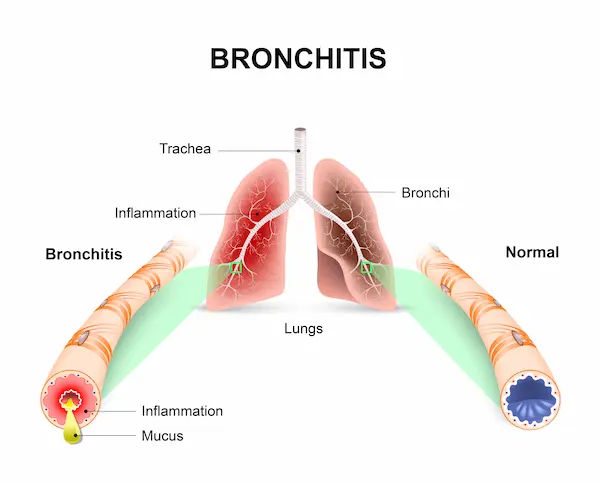Guide to Acute And Chronic Bronchitis
Learn the difference between acute and chronic bronchitis, their causes, symptoms, diagnosis, and treatment options. Understand when a cough is temporary and when it signals COPD.

Written by Dr. Mohammed Kamran
Reviewed by Dr. Rohinipriyanka Pondugula MBBS
Last updated on 13th Jan, 2026

That nagging, deep chest cough that seems to drag on for weeks—chances are, you’ve experienced bronchitis. But did you know there are two distinct types? Acute bronchitis is an extremely common, temporary inflammation of the airways often following a cold. Chronic bronchitis, however, is a serious, long-term condition and a key component of COPD. This guide will demystify both forms of bronchitis, helping you understand their causes, from common viruses to lifestyle factors like smoking. We’ll break down the symptoms, so you know what to look for, and outline effective treatment and management strategies for both short-term relief and long-term lung health. Knowing the difference is the first step toward breathing easier.
What is Bronchitis?
Bronchitis is the inflammation and swelling of the bronchial tubes, the airways that carry air to and from your lungs. When these tubes become irritated and inflamed, they swell and produce excess mucus (phlegm). This thickening of the airway walls and the mucus buildup makes it harder for air to flow freely, leading to the hallmark symptom: a persistent, often productive cough as your body tries to clear the obstruction.
The Role of Your Bronchial Tubes
- Think of your respiratory system as an upside-down tree. Your windpipe (trachea) is the trunk, which splits into two main branches called bronchi (singular: bronchus). These bronchi further divide into smaller and smaller branches (bronchioles) throughout your lungs, ending in tiny air sacs called alveoli where oxygen enters the blood. Bronchitis specifically targets the main bronchi and their larger branches, disrupting the vital airflow into the lungs.
Acute Bronchitis: The Common Chest Cold
Often called a "chest cold," acute bronchitis is a short-term illness that typically improves within a week to 10 days, though the cough can linger for several weeks after the infection has cleared. It’s one of the most common conditions seen by healthcare providers.
Causes of Acute Bronchitis
- In over 90% of cases, acute bronchitis is caused by viruses, the same ones responsible for the common cold and influenza. It’s far less commonly caused by bacterial infections. Irritants like tobacco smoke, dust, fumes, vapors, and air pollution can also trigger acute bronchitis.
Symptoms of Acute Bronchitis
The primary symptom is a cough, which may be dry or productive (bringing up clear, yellow, or green mucus). Other bronchitis symptoms include:
- Chest congestion or tightness
- Fatigue
- Mild fever and chills
- Body aches
- Sore throat
- Shortness of breath (usually mild)
How Long Does Acute Bronchitis Last?
- Most people start feeling better relatively quickly. The initial viral phase often lasts 3-5 days, but the bronchitis cough can be stubborn, persisting for 3 weeks or more as the inflamed airways heal. If your cough lasts longer than three weeks, it’s a good idea to consult a doctor to rule out other causes.
Chronic Bronchitis: A Serious COPD Condition
Chronic bronchitis is defined by a productive cough that occurs on most days for at least three months out of the year, for two consecutive years. It’s not a temporary infection but a long-term, progressive disease. It is one of the two main conditions classified under the umbrella term Chronic Obstructive Pulmonary Disease (COPD), with emphysema being the other.
Causes and Risk Factors of Chronic Bronchitis
The primary cause is overwhelmingly cigarette smoking. The constant irritation from smoke damages the cilia (tiny hair-like structures that sweep mucus out of the airways) and inflames the bronchial lining, leading to excessive mucus production. Other risk factors include long-term exposure to:
- Secondhand smoke
- Air pollution
- Chemical fumes and dust (often occupational, like from grain dust or textile fumes)
- A history of frequent respiratory infections
Recognising the Symptoms of Chronic Bronchitis
Symptoms are more severe and persistent than the acute form:
- A daily, productive bronchitis cough (often called a "smoker's cough")
- Frequent respiratory infections (colds, flu, etc.)
- Wheezing
- Shortness of breath that worsens over time, especially with physical activity
- Chest tightness
- Fatigue and low energy
- In severe cases, bluish discoloration of the lips and skin due to low oxygen (cyanosis)
How is Chronic Bronchitis Diagnosed?
If chronic bronchitis is suspected, a doctor will go beyond a physical exam. Diagnosis typically involves:
- Pulmonary Function Tests (PFTs): The most important test, spirometry, measures how much air you can exhale and how quickly. It assesses the degree of airway obstruction.
- Chest X-Ray: To rule out other lung conditions like pneumonia or heart failure that can cause similar symptoms.
- CT Scan: Provides a more detailed image of the lungs.
- Arterial Blood Gas Test: Measures the amount of oxygen and carbon dioxide in your blood to see how well your lungs are working.
Acute vs. Chronic Bronchitis
Understanding the distinction is crucial for proper treatment and outlook.
Comparison Table: Duration, Causes, and Outlook
Consult Top Specialists
Diagnosing Bronchitis: When to See a Doctor
You can often manage acute bronchitis at home. However, you should see a doctor if:
- Your cough lasts more than three weeks.
- You have a high fever (over 100.4°F or 38°C) that doesn't subside.
- You are wheezing or experiencing significant shortness of breath.
- You cough up blood or rust-colored phlegm.
- You have an underlying chronic heart or lung condition (e.g., asthma, COPD, heart failure).
Physical Examination and History
A doctor will listen to your lungs with a stethoscope for sounds of congestion, wheezing, or abnormal breathing. They will ask about your symptoms, their duration, your smoking history, and exposure to irritants.
Diagnostic Tests
- Chest X-Ray: Crucial to rule out pneumonia, which can have similar symptoms but requires different treatment (like antibiotics).
- Pulmonary Function Test (PFT): Essential for diagnosing chronic bronchitis and assessing its severity.
- Sputum Test: Analyzing the mucus you cough up can help identify if a bacterial infection is present and guide antibiotic use.
If your symptoms persist beyond two weeks or you have trouble breathing, consult a doctor online with Apollo24|7 for further evaluation and to rule out more serious conditions.
Treatment and Management Strategies
Treatment differs vastly between the two conditions.
Treating Acute Bronchitis
Since it's usually viral, antibiotics are ineffective. Treatment focuses on symptom relief:
- Rest and Hydration: Helps your body fight the virus and thins mucus.
- Over-the-Counter (OTC) Medicines:
- Cough suppressants (e.g., dextromethorphan) for dry, hacking coughs.
- Expectorants (e.g., guaifenesin) to loosen mucus and make coughing more productive.
- Pain relievers/fever reducers like ibuprofen or acetaminophen.
- Humidifier or Steam: Moist air can help soothe irritated airways and loosen congestion.
Managing Chronic Bronchitis
The goal is to control symptoms, improve quality of life, and slow disease progression. Chronic bronchitis treatment plans are comprehensive and often include:
- Smoking Cessation: The absolute most important step. If your condition does not improve after trying these methods, book a physical visit to a doctor with Apollo24|7 to create a personalized quit plan, which may include counseling, nicotine replacement therapy, or medication.
- Medications:
- Bronchodilators: Inhaled medications that help relax and open the airways.
- Inhaled Corticosteroids: Reduce inflammation in the airways.
- Combination Inhalers: Contain both a bronchodilator and a steroid.
- Pulmonary Rehabilitation: A program that includes exercise training, nutrition advice, and education to
- help you stay active and manage your disease.
- Oxygen Therapy: For those with severe chronic bronchitis and low blood oxygen levels.
Home Remedies and Lifestyle Changes for Relief
- Stay Hydrated: Drink plenty of water, herbal tea, and broth. Fluids thin mucus, making it easier to expel.
- Gargle with Salt Water: Can soothe a sore throat irritated by coughing.
- Use a Humidifier: Especially at night, to moisten the air and prevent your airways from drying out.
- Honey: A teaspoon of honey (not for children under 1) can coat the throat and act as a natural cough suppressant.
The Single Most Important Change for Chronic Bronchitis
- For those with chronic bronchitis, quitting smoking is non-negotiable. It’s the only intervention that can slow the accelerated decline of lung function. Avoiding secondhand smoke and other lung irritants is equally critical.
Prevention: How to Reduce Your Risk
- Don't Smoke and Avoid Secondhand Smoke: The top preventative measure.
- Get Vaccinated: The annual flu shot and pneumococcal vaccine can prevent infections that can lead to or worsen bronchitis.
- Wash Your Hands: Frequent handwashing reduces your risk of catching viral infections.
- Wear a Mask: If you work around dust, chemical fumes, or are in crowded places during cold and flu season, a mask can protect your airways.
Conclusion
Understanding the crucial difference between acute and chronic bronchitis empowers you to take the right steps for your health. While the former is a temporary, albeit annoying, illness that resolves on its own, the latter is a serious chronic condition demanding lifelong management. The common thread is airway irritation, but the causes and implications are worlds apart. Listening to your body is key—a lingering cough shouldn’t be ignored. By adopting preventive measures like quitting smoking and staying up-to-date on vaccinations, you can protect your lung health for years to come. If you’re struggling with a persistent cough or breathing difficulties, don’t hesitate to seek professional medical advice to get a proper diagnosis and create an effective management plan. Your breath is your life—protect it.
Consult Top Specialists
Consult Top Specialists

Dr. Tamal Bhattacharyya
Pulmonology Respiratory Medicine Specialist
8 Years • MBBS, MD (Respiratory Medicine)
Kolkata
MCR SUPER SPECIALITY POLY CLINIC & PATHOLOGY, Kolkata

Santoshkumar P Hammigi
Pulmonology Respiratory Medicine Specialist
4 Years • MBBS,MD, (Respiratory Medicine)
Bengaluru
Apollo Medical Center, Marathahalli, Bengaluru
(25+ Patients)

Dr. Tamal Bhattacharyya
Pulmonology Respiratory Medicine Specialist
8 Years • MBBS, MD (Respiratory Medicine)
East Midnapore
VIVEKANANDA SEBA SADAN, East Midnapore

Dr. P Sravani
Pulmonology Respiratory Medicine Specialist
3 Years • MBBS, MD
Visakhapatnam
Apollo Clinic Vizag, Visakhapatnam

Dr Rakesh Bilagi
Pulmonology Respiratory Medicine Specialist
10 Years • MBBS MD PULMONOLOGIST
Bengaluru
Apollo Clinic, JP nagar, Bengaluru
Consult Top Specialists

Dr. Tamal Bhattacharyya
Pulmonology Respiratory Medicine Specialist
8 Years • MBBS, MD (Respiratory Medicine)
Kolkata
MCR SUPER SPECIALITY POLY CLINIC & PATHOLOGY, Kolkata

Santoshkumar P Hammigi
Pulmonology Respiratory Medicine Specialist
4 Years • MBBS,MD, (Respiratory Medicine)
Bengaluru
Apollo Medical Center, Marathahalli, Bengaluru
(25+ Patients)

Dr. Tamal Bhattacharyya
Pulmonology Respiratory Medicine Specialist
8 Years • MBBS, MD (Respiratory Medicine)
East Midnapore
VIVEKANANDA SEBA SADAN, East Midnapore

Dr. P Sravani
Pulmonology Respiratory Medicine Specialist
3 Years • MBBS, MD
Visakhapatnam
Apollo Clinic Vizag, Visakhapatnam

Dr Rakesh Bilagi
Pulmonology Respiratory Medicine Specialist
10 Years • MBBS MD PULMONOLOGIST
Bengaluru
Apollo Clinic, JP nagar, Bengaluru
More articles from Bronchitis
Frequently Asked Questions
Is bronchitis contagious?
Yes, acute bronchitis caused by a virus or bacteria is contagious. You can spread the germs through droplets when you cough, sneeze, or talk. The condition itself isn't contagious, but the underlying infection is. Chronic bronchitis is not contagious; it's caused by long-term airway irritation.
How can you tell if bronchitis is viral or bacterial?
It can be difficult. Viral bronchitis is far more common and often starts with cold symptoms (runny nose, sore throat). Bacterial infections are rarer and may produce thicker, greenish mucus and be accompanied by a higher fever. Only a doctor can determine the cause for sure, often by reviewing symptoms and sometimes with a sputum test.
What does a bronchitis cough sound like?
A bronchitis cough is often deep, hacking, and 'productive,' meaning it brings up phlegm (mucus). It can sound wet or chesty. In chronic bronchitis, it's frequently described as a persistent, rattling smoker's cough.
What is the fastest way to get rid of bronchitis?
There is no instant cure, but you can speed up recovery by getting plenty of rest, drinking fluids to thin mucus, using a humidifier, and taking OTC medications to manage cough and pain. For acute bronchitis, time is the primary healer.
When should you go to the ER for bronchitis?
Seek emergency care if you experience severe shortness of breath that makes speaking difficult, high fever that doesn't respond to medication, chest pain, or if you cough up significant amounts of blood.




